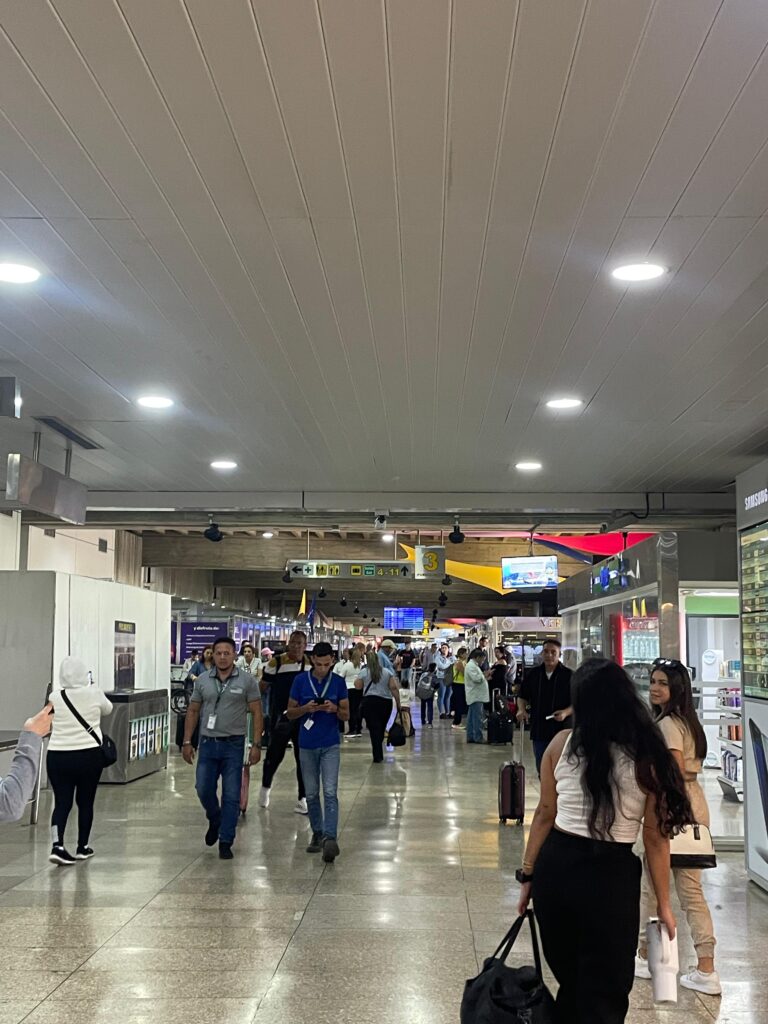Not Everyone Who Is Traveling to Vote Is Coming From Outside Venezuela
Domestic flights are full of people crossing the country, like me, to vote in their hometowns


At this point, you’ve probably seen them too: Venezuelans arriving in the country, ready to vote; a sort of Avengers assemble. But Maiquetía is not only packed by them. Dozens, hundreds —maybe thousands if we want to be optimistic— are traveling inside the country, to their hometowns to vote.
Although I built my life in Caracas, I’m originally from Guanare, Portuguesa – so I was one of them. I jumped on a plane from Maiquetía to Barinas, a route I have done many times in the past, and saw an airport full of people. The fullest I have ever seen it. I even laughed a little to myself thinking “oh, so this is how this is supposed to look!”
Everyone I spoke with was on their way to vote, like Lismar Irratia, who works in Caracas and asked for the day off on Monday to go back. “How could I have not done this, if I had been voting against them for 24 years? All of us need to vote,” she told me. She was even wearing an “I vote to save democracy” t-shirt.
Others were shier. My aisle companions were two guys in their 30s. We laughed about the lack of a window on our seat and they told me they were very excited to go back home. They were in Puerto Ordaz for work, so that was their second flight of the day. When I asked if they did that to vote, they changed the subject quickly. One of them later asked me if I was voting. When I confirmed I was, he said “ah, chévere,” but kept playing on his phone.
There was also the lady who got off the plane with me. We first started talking about how hot Barinas was, but quickly the conversation turned into the lack of flights –currently just two airlines do that route– and how it was “better to fly on Friday, because you never know what can happen tomorrow.” She said that she really wanted to get here, just to make sure nothing got in the way of her and voting on Sunday.
Every step of the way I was determined to listen to what people were saying. My favorite one was in Maiquetía, when the crew called our flight to board: a dad and his kid, a little girl who couldn’t be older than 7 years, discussing how they were traveling “for freedom, for democracy.” While I was waiting for my luggage in Barinas I overheard a conversation between two girls in their twenties. One asked the other if she was traveling to vote. She said she wasn’t, that she was just due to visit her family, “but since I’m here…”

I also even had the guy screaming “¡Por Venezuela!” as we were getting off the plane. Sadly, the emotion didn’t catch up.
Not all traveled by plane. This week, as I was saying goodbye to one of the cleaning ladies in my building in Caracas, she told me she also wasn’t planning on coming until at least Wednesday. She was traveling to Puerto Cabello to vote. “And that way I can go to the beach and celebrate”, she said.
We drove through the Autopista Jose Antonio Paez from Barinas to Guanare. It’s weird to see it almost completely empty. I was sure there was going to be some traffic and we were going to face at least a couple of control points. None of that happened.
Nevertheless, as soon as I got to Guanare, my mom started reading messages from people who were seeking a ride to get here. Of course, this activity was interrupted by a 30-minute power shortage that even surprised my parents. “We haven’t had one of these since the campaign started.”
But nothing can erase the feeling of seeing some parents in the airport with yellow, blue and red balloons waiting for their son – who they haven’t seen in seven years. There were a lot of tears at the airport today. I even overheard someone saying that María Corina promised to bring our kids back. “She is already doing it, even if it is just to vote.”
Caracas Chronicles is 100% reader-supported.
We’ve been able to hang on for 22 years in one of the craziest media landscapes in the world. We’ve seen different media outlets in Venezuela (and abroad) closing shop, something we’re looking to avoid at all costs. Your collaboration goes a long way in helping us weather the storm.
Donate




